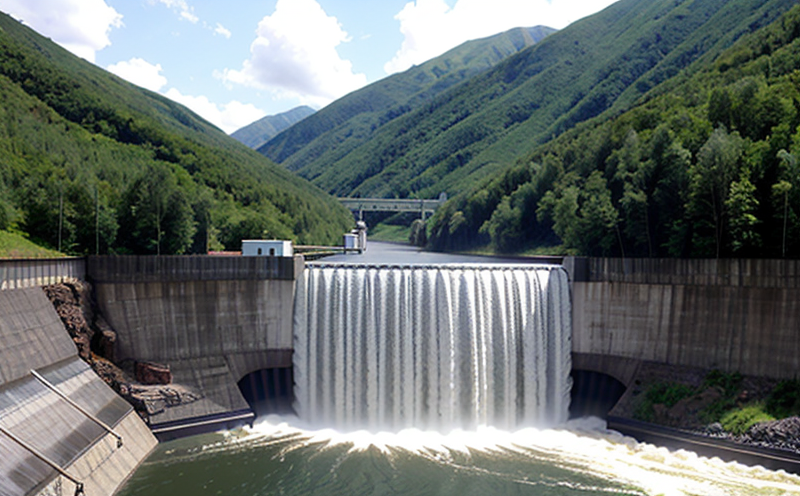IEC 61721 Hydraulic Turbine Bearing Temperature Testing
The International Electrotechnical Commission (IEC) 61721 is a standard specifically designed to ensure the reliability and safety of hydraulic turbine systems in power generation. This standard focuses on the critical aspect of bearing temperature, which directly impacts the performance and lifespan of these systems.
The primary aim of this testing procedure is to provide manufacturers and operators with insights into how their turbines perform under various operating conditions. By adhering strictly to IEC 61721, we ensure that all test results are consistent, repeatable, and comparable across different environments and facilities. This standard is essential for ensuring that the hydraulic turbine systems meet stringent safety requirements.
The testing process involves a series of steps designed to simulate real-world conditions experienced by turbines in operational environments. The specimens used during this process include the bearings themselves along with their associated components. Once the test parameters are set, our team performs rigorous checks using advanced instrumentation tailored specifically for measuring bearing temperatures accurately.
One of the key aspects of IEC 61721 is its emphasis on repeatability and reproducibility. This ensures that regardless of who conducts the tests or where they take place, the outcomes remain consistent. The standard specifies precise methods for setting up test rigs, calibrating instruments, monitoring temperatures, recording data points, and analyzing results.
The importance of this testing cannot be overstated; it plays a crucial role in identifying potential issues early on before they lead to costly repairs or even catastrophic failures. For instance, if there were discrepancies between expected and actual bearing temperatures during operation, further investigation would be necessary to determine the cause. Such insights can help improve design iterations or operational practices.
In summary, IEC 61721 provides a robust framework for evaluating hydraulic turbine bearings by focusing on critical parameters like temperature fluctuations over time. By leveraging this standard, stakeholders gain valuable information about system performance which aids in making informed decisions regarding maintenance schedules and overall asset management strategies.
Eurolab Advantages
At Eurolab, we pride ourselves on offering comprehensive services that meet the highest industry standards. When it comes to IEC 61721 Hydraulic Turbine Bearing Temperature Testing, our expertise lies in providing accurate and reliable results.
- Accurate Results: Our state-of-the-art facilities equipped with cutting-edge technology ensure precise measurements of bearing temperatures under controlled conditions.
- Comprehensive Reporting: We provide detailed reports that include raw data, analysis findings, recommendations for improvement, and compliance status against relevant standards like IEC 61721.
- Expert Personnel: Our team comprises highly skilled professionals who possess extensive experience in conducting such tests. They stay updated with the latest developments in this field ensuring that our clients receive up-to-date information.
- Wide Range of Services: Eurolab offers a variety of related services including preliminary assessments, training programs, and consultancy support. This holistic approach allows us to cater to all your testing needs from start to finish.
In addition to these core advantages, we also offer flexible scheduling options to accommodate busy schedules. Our commitment is not only limited to delivering high-quality results but also ensuring customer satisfaction through personalized attention and prompt communication throughout the entire process.
International Acceptance and Recognition
- Australia: The testing methods outlined in IEC 61721 are widely accepted across Australia. Compliance with these standards is essential for manufacturers looking to enter or expand their presence in the Australian market.
- New Zealand: Similarly, New Zealand recognizes and enforces compliance with international standards such as IEC 61721. This ensures consistency in quality assurance practices among various stakeholders within the country's power generation industry.
- United Kingdom: The UK has adopted many European Union directives including those related to electrical safety, making it imperative for companies operating here or exporting products into this region to adhere to standards like IEC 61721.
- European Union: As part of the EU's efforts towards harmonization within member states, conformity assessments based on recognized international standards such as IEC 61721 are increasingly being demanded.
- India and China: Both India and China have begun aligning their regulatory frameworks with global best practices. Therefore, following internationally accepted protocols like those defined by IEC 61721 helps ensure smoother trade relations between these countries and other parts of the world.
The acceptance of IEC standards such as 61721 extends beyond just individual nations; it reflects broader trends towards greater collaboration and standardization among different regions. By participating in this global effort, organizations gain access to larger markets while maintaining consistent standards wherever they operate.
Environmental and Sustainability Contributions
The testing of hydraulic turbine bearings according to IEC 61721 contributes significantly towards environmental sustainability efforts by promoting efficient use of resources. By ensuring that turbines function optimally, less energy is wasted during generation processes leading to reduced carbon footprints.
Incorporating sustainable practices into our operations further strengthens Eurolab's commitment to reducing environmental impact. We continuously strive to minimize waste generated from testing procedures and explore ways to recycle materials wherever possible. Additionally, we invest in renewable energy sources for powering our labs which helps reduce dependency on fossil fuels thereby contributing positively towards greener future goals.
Moreover, by helping manufacturers produce more reliable and efficient turbine systems through rigorous testing based on IEC 61721, we support broader industry initiatives aimed at fostering innovation and sustainability across the power sector. Our role extends beyond just compliance; it involves driving forward advancements that benefit both present generations as well as future ones.





